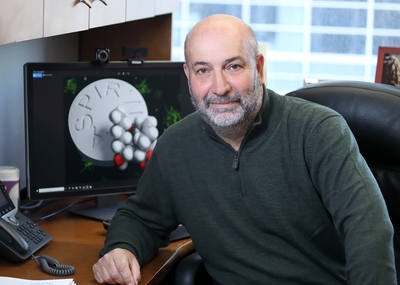
Research Topics
The Molecular Epidemiology Section (MES) brings together a unique skill set that combines epidemiological and laboratory research. We perform molecular epidemiology studies of prostate and breast cancer with a focus on health disparity and utilize translational research and systems biology approaches to identify exposures and related pathways that drive tumor development and progression. We seek to improve disease outcomes among African-Americans by gaining an understanding of their tumor biology, and how this knowledge can be harnessed to improve cancer prevention and care. Our research includes the large-scale analysis of gene expression, the evaluation of the tumor metabolome and proteome, and the discovery of biomarkers for disease development and progression. It also involves the analysis of genetic variations and their association with cancer using candidate gene approaches and the application of genome-wide association studies. Thus, our program applies innovative research strategies and is complementary and fully integrated into the transdisciplinary and collaborative research environment within the Laboratory of Human Carcinogenesis (LHC). This environment uses shared resources with a common Precision Medicine approach that integrates biology, population-based research, and clinical studies to advance prevention, early diagnosis, and clinical care of common and lethal cancer types.
MES is supported by a resource contract that provides an infrastructure to conduct epidemiological studies in the greater Baltimore area and to collect biospecimens, including tumor and non-tumor tissues and blood samples. The contract has been successfully used to collect fresh-frozen breast tumors from African-American (AA) and European-American (EA) patients with long-term survival follow-up. This valuable resource enabled us to recruit AA and EA males into a large case-control study of prostate cancer (976 cases, 1034 population-based controls) to address additional needs for health disparity research. Recruitment into this study has been completed in 2016, a major milestone for MES, establishing a cohort with a large biospecimen repository in which half of the cases and controls are self-identified and ancestry-typed AA men. Additionally, we are recruiting breast cancer patients into a research study that will evaluate the relationship between stress-related exposures (e.g., social isolation and discrimination) and tumor biology in breast cancer and compare AA with EA patients in this study.
MES strives to use novel and high-risk approaches to gain an understanding of tumor biology in the context of environmental exposures, health disparity, ancestry, and low-penetrance genetic susceptibility. We seek to identify exposures and related pathways that drive tumor development and progression, and then examine how this knowledge can be used to improve cancer prevention and care. One example is the discovery of an immune-inflammation signature in prostate tumors of AA men using transcriptomics and the translation of this finding into the design of a population-based case-control study, which showed that the anti-inflammatory drug, aspirin, may significantly reduce aggressive disease in this patient group. Another example of an innovative design is our breast cancer metabolome study that combined metabolome profiling with a large-scale analysis of gene expression and DNA methylation, leading to the characterization of 2-hydroxyglutarate as a Myc-linked breast cancer oncometabolite and the discovery of a poor outcome tumor subtype with a distinct DNA methylation profile, a high tissue concentration of 2-hydroxyglutarate and heightened occurrence in AA patients.
Our research program is ultimately aimed to improve disease prevention and patient care. The scope of our research program is complementary to other research activities at the LHC and is aligned with the vision of building a collaborative Precision Medicine framework within the LHC and NCI. It is also consistent with the priorities set by the Cancer Moonshot Task Force. We have a strong common interest to improve health outcomes through biomarker discovery and cancer health disparity research. Like other research programs at the LHC, MES continues to examine the contribution of the tumor microenvironment, infections, and chronic inflammation to cancer development and aggressiveness. Our goals are achieved in a collaborative research environment and are consistent with the overall goals of the NCI Intramural Research Program and NCI’s Precision Medicine Initiative for Oncology that seeks to advance research in Precision Medicine and Prevention, cancer health disparity and cancer inflammation, focusing on common and lethal cancers. NCI also encourages an interdisciplinary research approach that leads to more effective methods for prevention, early detection, diagnosis, and therapy. These priorities are firmly embedded in our program.
Cancer risk is driven by carcinogen exposure and inherited or acquired host factors. Inherited susceptibility factors (e.g., common variations in the genetic code and inherited mutations within a family), will modulate the effects of carcinogen exposure on human cancer risk. Heritable factors can also influence a patient's response to therapy and can become biomarkers for therapeutic outcome. Heritable effects of genes on cancer risk can range from low to high. Inherited mutations in tumor suppressor genes (e.g., BRCA1, BRCA2, TP53, PTEN) are associated with familial cancer syndromes and predispose individuals to a high risk of cancer, largely independent of any additional exposure. However, these mutations are rare, and these highly penetrant single gene mutations account for less than 10% of all cancers. In contrast, common genetic variations, such as single nucleotide polymorphisms, contribute to common cancers. It is thought that most of cancer cases are caused, at least in part, by the collective effect of multiple, low penetrant genetic variations in a large group of genes and their interactions with environmental exposures. Our group is studying common genetic variations in genes of cancer-related pathways (e.g., the inflammation pathway), and examines how these variations influence cancer risk in the context of ethnicity and/or exposure to environmental risk factors. We are also evaluating how common genetic variations influence the response of patients to therapy.
The Institute of Medicine concluded that not all segments of the U.S. population have equally benefited from the advances in our knowledge and treatment of cancer. As a result, AAs have the highest death rates from all cancer sites combined, and from malignancies of the lung, colon and rectum, breast, prostate, and the cervix of all racial groups in the United States. Recent research showed that racial disparities in prostate and breast cancer survival between AA and EA patients can persist in randomized clinical trials, indicating that intrinsic differences in tumor biology may contribute to the disparities in survival between these two patient cohorts. Our group seeks to identify the race/ethnic differences in tumor biology that may either influence the presentation of the disease (e.g., causing a more aggressive disease among AA patients), or influence the response to therapy (e.g., causing an inferior response among AA patients). Any of these differences, if they exist, are not likely to be generalizable, meaning that all AA patients are equally different from all EA patients. Rather we believe that certain biologically-derived poor outcome factors are more prevalent among AA patients than EA patients, and that future clinical interventions will have to target these factors across all patient groups.
Acute and chronic inflammation is commonly observed in prostate biopsies and frequently occurs near prostatic intraepithelial neoplasia, a precursor lesion for prostate tumors. It has been proposed that the inflammation-to-carcinoma sequence is common in the development of human prostate cancer. A pro-inflammatory tumor environment is also a trigger for disease progression and cancer metastasis. The causes of prostatic inflammation are poorly understood but could be caused by chronic infections and other environmental exposures. Our research discovered a pro-inflammatory interferon gene signature in tumors of AA patients, suggesting the possible involvement of viral infections in disease pathology. We also observed a unique gene expression profile in prostate tumors associated with current smoking that indicates an altered immune environment in tumors of current smokers. This observation could be very significant because current smoking increases the risk of metastatic prostate cancer. These findings are being further pursued in the context of the NCI-Maryland Case-Control study.
Biography
Selected Publications
- Tang W, Putluri V, Ambati CR, Dorsey TH, Putluri N, Ambs S. Liver- and Microbiome-derived Bile Acids Accumulate in Human Breast Tumors and Inhibit Growth and Improve Patient Survival. Clin Cancer Res. 2019;25(19):5972-5983.
- Mishra P, Tang W, Putluri V, Dorsey TH, Jin F, Wang F, Zhu D, Amable L, Deng T, Zhang S, Killian JK, Wang Y, Minas TZ, Yfantis HG, Lee DH, Sreekumar A, Bustin M, Liu W, Putluri N, Ambs S. ADHFE1 is a breast cancer oncogene and induces metabolic reprogramming. J Clin Invest. 2018;128(1):323-340.
- Pichardo MS, Smith CJ, Dorsey TH, Loffredo CA, Ambs S. Association of Anthropometric Measures with Prostate Cancer among African American Men in the NCI-Maryland Prostate Cancer Case-Control Study. Cancer Epidemiol Biomarkers Prev. 2018;27(8):936-944.
- Tang W, Wallace TA, Yi M, Magi-Galluzzi C, Dorsey TH, Onabajo OO, Obajemu A, Jordan SV, Loffredo CA, Stephens RM, Silverman RH, Stark GR, Klein EA, Prokunina-Olsson L, Ambs S. IFNL4-ΔG Allele Is Associated with an Interferon Signature in Tumors and Survival of African-American Men with Prostate Cancer. Clin Cancer Res. 2018;24(21):5471-5481.
- Smith CJ, Dorsey TH, Tang W, Jordan SV, Loffredo CA, Ambs S. Aspirin Use Reduces the Risk of Aggressive Prostate Cancer and Disease Recurrence in African-American Men. Cancer Epidemiol Biomarkers Prev. 2017;26(6):845-853.
Related Scientific Focus Areas
This page was last updated on Thursday, April 4, 2024




